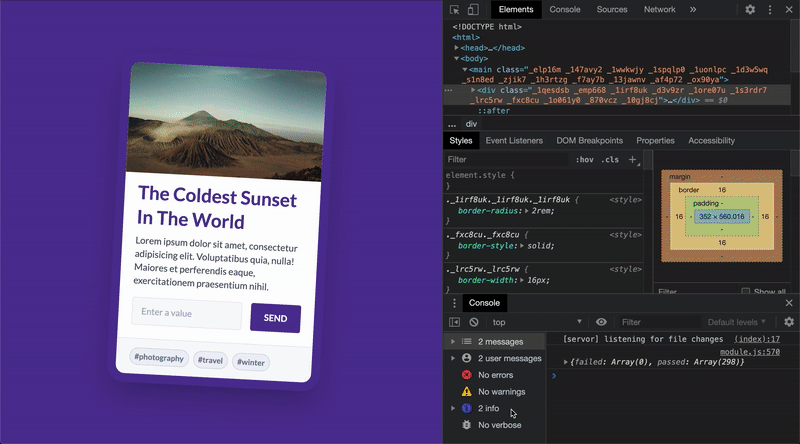
Security News
CVE Volume Surges Past 48,000 in 2025 as WordPress Plugin Ecosystem Drives Growth
CVE disclosures hit a record 48,185 in 2025, driven largely by vulnerabilities in third-party WordPress plugins.
compiles tailwind like shorthand syntax into css at runtime
This library takes inspiration from Tailwind and utilizes Otion to provide means of efficiently generating atomic styles from shorthand syntax and appending them to the DOM at runtime.
Server side rendering and static extraction is also supported.
⚡️ Check out the live and interactive demo

The aim here was to create a compiler that:
The library currently weighs under 10kb and supports the vast majority of Tailwind directives and variants.
To use the library, first import the module then invoke the default export using tagged template syntax:
import ow from 'https://unpkg.com/oceanwind';
document.body.className = ow`h-full bg-purple-500 rotate-3 scale-95`;
Running the above code will result in the following happening:
h-full -> { height: 100vh }).It is recommended to import the following css files which help normalize styles across browsers:
Importing and invoking oceanwind directly will cause it to use default theme for directives that require themed values (like bg-red-500 for example). To customize the theme, use the themed export instead of the default export.
import { themed } from 'https://unpkg.com/oceanwind';
const ow = themed({
colors: {
red: {
500: 'hotpink',
},
},
});
ow`bg-red-500`; // will result in a hotpink background-color
Any custom theme provided to the themed function will be deep merged with the default theme.
It is possible to invoke oceanwind in a multitude of different ways. For example:
// Function call passing a string
ow('bg-red-500 rounded');
// Tag Template Literal (falsey interpolations will be omitted)
ow`bg-red-500 rounded`;
ow`bg-red-500 ${false && 'rounded'}`;
// Function call passing an array (falsey items will be omitted)
ow(['bg-red-500', 'rounded']);
ow(['bg-red-500', false && 'rounded']);
// Function call passing an object (keys with falsey values will be omitted)
ow({ 'bg-red-500': true, rounded: true });
ow({ 'bg-red-500': true, rounded: false });
Directives with the same variants can be grouped using parenthesis. Oceanwind will expand the nested directives; applying the variant to each directive in the group before translation. For example:
Notice any directives within tagged template literals can span multiple lines
ow`
sm:hover:(
bg-black
text-white
)
md:(bg-white hover:text-black)
`;
It is possible to nest groupings too, for example:
ow`
sm:(
bg-black
text-white
hover:(bg-white text-black)
)
`;
Two things to note here is that the outermost variant should always be a responsive variant (just like in tailwind hover:sm: is not supported) and that nesting responsive variants doesn't make sense either, for example sm:md: is not supported.
By default warnings about missing or duplicate translations will be written to the console:

Clicking on the file path in dev tools will jump to the line in the file in the sources panel.
It is possible to make oceanwind throw an error rather just warning by opting into strict mode:
themed({ strict: true });

Most of the time developers will be using a front end framework to render DOM elements. Oceanwind is framework agnostic but here is an example of how you might use it with preact and no build step.
⚡️ Check out the live and interactive demo
import { render, h } from 'https://unpkg.com/preact?module';
import htm from 'https://unpkg.com/htm?module';
import ow from 'https://unpkg.com/oceanwind';
const html = htm.bind(h);
render(
html`
<div className=${ow`h-full bg-purple-500`}>
<h1 className=${ow`text-white font-bold`}>Hello World</h1>
</div>
`,
document.body
);
Oceanwind supports SSR through Otion. Consider the following example:
import { h } from 'preact';
import render from 'preact-render-to-string';
import htm from 'htm';
import { getStyleTag, VirtualInjector } from 'otion/server';
import { setup, themed } from 'oceanwind';
const injector = VirtualInjector();
setup({ injector });
const html = htm.bind(h);
const ow = themed({});
const style = {
main: ow`clearfix`,
};
const app = html`<main className=${style.main}>hello oceanwind</main>`;
const appHtml = render(app);
const styleTag = getStyleTag(injector);
// Inject styleTag to your HTML now.
Oceanwind also exposes hydrate from Otion for client-side hydration. See Otion documentation for further configuration options and usage instructions.
I'd like to thank both Adam Wathan and Kristóf Poduszló for their amazing work with Tailwind and Otion respectively, which made making this library somewhat a breeze. Also Phil Pluckthun who helped me deduce the initial grammar.
FAQs
compile tailwind like shorthand syntax into css at runtime
We found that oceanwind demonstrated a not healthy version release cadence and project activity because the last version was released a year ago. It has 1 open source maintainer collaborating on the project.
Did you know?

Socket for GitHub automatically highlights issues in each pull request and monitors the health of all your open source dependencies. Discover the contents of your packages and block harmful activity before you install or update your dependencies.

Security News
CVE disclosures hit a record 48,185 in 2025, driven largely by vulnerabilities in third-party WordPress plugins.

Security News
Socket CEO Feross Aboukhadijeh joins Insecure Agents to discuss CVE remediation and why supply chain attacks require a different security approach.

Security News
Tailwind Labs laid off 75% of its engineering team after revenue dropped 80%, as LLMs redirect traffic away from documentation where developers discover paid products.